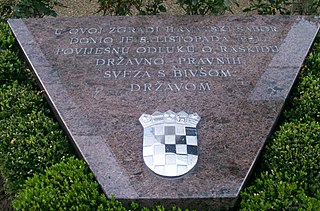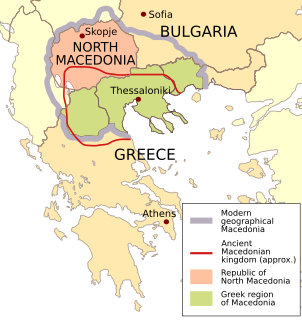
The foreign relations of North Macedonia since its independence in 1991 have been characterized by the country's efforts to gain membership in international organizations such as NATO and the European Union and to gain international recognition under its constitutional name, overshadowed by a long-standing, dead-locked dispute with neighboring Greece. Greek objections to the country's name have led to it being admitted to the United Nations and several other international fora only under the provisional designation Former Yugoslav Republic of Macedonia.

The Socialist Republic of Macedonia was one of the six constituent countries of the Socialist Federal Republic of Yugoslavia, and a socialist nation state of the Macedonians. After the transition of the political system to parliamentary democracy in 1990, the Republic changed its official name to Republic of Macedonia in 1991, and with the beginning of the breakup of Yugoslavia, it declared itself an independent country on 8 September 1991.

The President of the Republic of North Macedonia is the head of state of North Macedonia. The institution of the Presidency of the modern Macedonian state began after the Macedonian declaration of independence on 8 September 1991. Its first president was Kiro Gligorov, the oldest president in the world until his resignation in 1999. The Macedonian presidency is largely a ceremonial post and the Prime Minister of North Macedonia is the country's leading political figure and de facto chief executive.

The Breakup of Yugoslavia occurred as a result of a series of political upheavals and conflicts during the early 1990s. After a period of political and economic crisis in the 1980s, constituent republics of the Socialist Federal Republic of Yugoslavia split apart, but the unresolved issues caused bitter inter-ethnic Yugoslav wars. The wars primarily affected Bosnia and Herzegovina, neighboring parts of Croatia and some years later, Kosovo.

The Act of Declaration of Independence of Ukraine was adopted by the Ukrainian parliament on 24 August 1991. The Act established Ukraine as an independent state.
Croatia held an independence referendum on 19 May 1991, following the Croatian parliamentary elections of 1990 and the rise of ethnic tensions that led to the breakup of Yugoslavia. With 83 percent turnout, voters approved the referendum, with 93 percent in favor of independence. Subsequently, Croatia declared independence and the dissolution of its association with Yugoslavia on 25 June 1991, but it introduced a three-month moratorium on the decision when urged to do so by the European Community and the Conference on Security and Cooperation in Europe through the Brioni Agreement. The war in Croatia escalated during the moratorium, and on 8 October 1991, the Croatian Parliament severed all remaining ties with Yugoslavia. In 1992, the countries of the European Economic Community granted Croatia diplomatic recognition and Croatia was admitted to the United Nations.

The Republic of Serbia was a constituent state of Federal Republic of Yugoslavia between 1992 and 2003 and the Union of Serbia and Montenegro from 2003 to 2006. With Montenegro's secession from the union with Serbia in 2006, both became sovereign states in their own right.

The Republic of Montenegro was a constituent federated state of the Federal Republic of Yugoslavia between 1992 and 2006. The declaration of independence of Montenegro in 2006 ended Yugoslavia.

The Declaration "On the Restoration of Independence of the Republic of Latvia" was adopted on 4 May 1990, by the Supreme Soviet of the Latvian SSR. The Declaration stated that, although Latvia had de facto lost its independence in 1940, when it was annexed by the Soviet Union, the country had de jure remained a sovereign country as the annexation had been unconstitutional and against the will of the people of Latvia. Therefore it resolved that the Molotov–Ribbentrop Pact and the Soviet occupation of Latvia in 1940 were illegal, and annulled the declaration on the accession of Latvia to the Soviet Union of 21 July 1940, re-instituted the Constitution of Latvia of 1922, which was thereupon partly suspended, and set a period of transition to de facto independence, which would end upon the first session of Saeima. It also ruled that during the transitional period the Constitution of the Latvian SSR and other laws would remain applicable as long as they did not contradict articles 1, 2, 3, and 6 of the Constitution of Latvia, which were reinforced by the declaration. It was provided that a committee to elaborate a new edition of the Constitution of Latvia should be created. Social, economic, cultural, and political rights were granted to citizens and residents of Latvia in accordance with international human rights. The declaration also stated that Latvia would form its relationship with the Soviet Union on the basis of the Latvian–Soviet Peace Treaty of 1920, in which the Soviet Union had recognized the independence of Latvia as inviolable "for all future time". The 4th of May is a national holiday in Latvia.

The Republic of Ilirida is a proposed state declared twice by politician Nevzat Halili, once in 1992 and once in 2014. The idea has been declared unconstitutional by the Macedonian government. The secessionist concept of Ilirida emerged in the early 1990s and was advocated by some Albanian politicians as a solution to concerns and disputes the Albanian community had regarding constitutional recognition and minority rights within Macedonia.
Independence and Unity Day is a Slovenian national holiday that occurs on every 26 December to commemorate the official proclamation of the Slovenian independence referendum on 26 December 1990. The referendum took place on 23 December that year. In it, 95% of the voters favoured the establishment of independent and sovereign nation. Between 1991 and 2005, the holiday used to be known simply as Independence Day. The current name was adopted in September 2005, following the proposal of the then-opposition Social Democrats, in order to emphasize the national consensus at the time of the 1990 referendum, which was supported by all political parties represented in the Assembly of the Socialist Republic of Slovenia at the time.

Montenegro - North Macedonia relations refer to foreign relations between Montenegro and the Republic of North Macedonia. The Macedonian Foreign Ministry states the two countries have excellent political ties, without any open issues between the two countries. The embassy of the Republic of North Macedonia to Montenegro is located in the capital city of Podgorica. Montenegro's embassy in North Macedonia is also located in the country's capital city, which is Skopje. Also, Montenegro has an honorary consulate in the city of Bitola.

North Macedonia–Serbia relations are bilateral relations between the Republic of North Macedonia and the Republic of Serbia.
An independence referendum was held in Bosnia and Herzegovina between 29 February and 1 March 1992, following the first free elections of 1990 and the rise of ethnic tensions that led to the breakup of Yugoslavia. Independence was strongly favored by Bosniak and Bosnian Croat voters while Bosnian Serbs boycotted the referendum or were prevented from participating by Bosnian Serb authorities. The total turnout of voters was 63.4%, 99.7% of whom voted for independence. On 3 March, Chairman of the Presidency of Bosnia and Herzegovina Alija Izetbegović declared the independence of the Republic of Bosnia and Herzegovina and the parliament ratified the action. On 6 April, the United States and the European Economic Community recognized Bosnia and Herzegovina as an independent state and on 22 May it was admitted into the United Nations.

The independence of Croatia was a process started with the changes in the political system and the constitutional changes in 1990 that transformed the Socialist Republic of Croatia into the Republic of Croatia, which in turn proclaimed the Christmas Constitution, and held the Croatian independence referendum, 1991.
An independence referendum was held in Kosovo, then known as the Autonomous Province of Kosovo and Metohija between 26 and 30 September 1991. The dissolved Provincial Assembly had declared the Republic of Kosova a sovereign and independent state on 22 September 1991. Over 99% of voters voted in favour of independence, with a turnout of 87%. The referendum was boycotted by Serbs living in the region, who comprised around 10% of the population.

Croatian Independence Day is a national public holiday marked yearly on 8 October that celebrates the unanimous decision of the Croatian Parliament to declare the independence of Croatia from the Socialist Federal Republic of Yugoslavia.

The Ukrainian sovereignty referendum was conducted on March 17, 1991, as part of the first and only Soviet Union referendum. Throughout the Ukrainian Soviet Socialist Republic, voters were asked two questions, with an additional question attached to the ballot in the historical region of Galicia which includes the Ukrainian provinces of Ivano-Frankivsk, Lviv, and Ternopil.

Yugoslavia was a charter member of the United Nations from its establishment in 1945 as the Socialist Federal Republic of Yugoslavia until 1992 during the Yugoslav Wars. It rejoined the UN under the Federal Republic of Yugoslavia in 2000 as a new member. Its seat was transferred to Serbia in 2006.

















